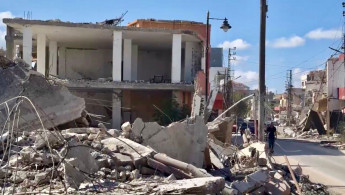In southern Lebanon, a brave few hold firm against Israel's strikes
Every morning the residents of Deir Sryan, a farming village in southern Lebanon near the Israeli border, wake up to the roar of Israeli aircraft and drones bombing their land, an unwelcome part of living on the frontlines of a raging conflict between Hezbollah and Israel.
Fearing for their safety, the vast majority of the town's residents have fled. Their homes sit empty, and their fields lie fallow.
But for a few brave residents, like 58-year-old Hussein Karim, giving up on the war-rattled town is simply not an option.
"I'm clinging to my land," Karim told The New Arab, "either I live on it, or die with it."
"We've been living under the shadow of war since the time we were born. But in the end, all we have is our homes and our land. If we leave our land and our livelihoods, we might lose them forever," said Karim.
Since October, Hezbollah and Israel have been trading shots across the border, turning southern Lebanon into a deadly second front in Israel's genocidal war on Gaza.
By the latest UN estimate, over 110,000 people have been displaced from South Lebanon, 564 killed and 2,412 injured.
Though the fallout is tame relative to the total destruction of Gaza, the damage is still extensive, and all-out war can erupt at any moment.
Hashem Haidar, head of the South Lebanon Council, estimated that about 4,000 homes have been completely razed and 20,000 badly damaged. That's on top of vast tracts of scorched agricultural land that will require years to restore.
Can't afford to leave
Even so, some Lebanese are sticking it out. Farmers like Karim worry that if they flee, their precious crops will wither and die, a loss they can ill afford.
"I find solace in farming," said Karim. "I plant and water crops like cucumbers, tomatoes, and parsley for daily use. I also have seedlings that I cannot leave for more than two days."
"These crops are the result of five years of effort, and I cannot abandon them," he said.
In December, Karim's family of four had enough of Israel's constant attacks. They packed it up for Beirut.
"My family, especially the daughters who are studying at universities and schools, could not endure the terror, bombardment, and airstrikes, so they had to flee to Beirut," said Karim, referring to his two daughters.
"Like any decent person, I only wish for this war to end, so we can return to our normal lives, and so we can stop taking anxiety medications that have become part of our daily lives because of all the fear and stress," said Karim.
In recent weeks, tensions have reached an all-time high, after an Israeli attack on a top Hezbollah commander struck inside a Beirut suburb. On August 25 the two sides exchanged the heaviest strikes since the last time they were formally at war, in 2006.
Karim estimates that only about two percent of his town's residents are still around. Even with the escalating tensions, he refuses to leave. It's high time for the production and sale of avocados and pine trees near his home, a lucrative trade that he says he can't afford to abandon.
"If I leave them for more than two or three days, I won't be able to harvest the crop, and there will be significant withering and losses. After five years of hard work, it is very difficult to abandon my season and livelihood," said Karim.
He's already lost dozens of trees to Israeli bombing campaigns. "I lost this season's walnut production worth about $15,000 because the trees were in a dangerous area that were subject to bombardment," he remarks bitterly.
As long as one stone remains
Surviving in a ghost town comes with its own challenges. With not a single shop open, Karim has to stock up on necessities like bread every fifteen days from outside the village. The rest of the time, he gets by on his own produce. "I pick vegetables from the land and eat them."
In Khiyam, another southern Lebanese town near the border with Israel, Hussein X is also stubbornly staying put.
"As long as my house is still standing, I will not leave," said Hussein, who estimates that over 80 percent of the town has fled to safer areas like Beirut or Tyre, especially those with young children or chronic health conditions.
Much of Khiyam has been levelled by strikes, including Hussein's photography studio.
"I lost a ton of equipment, and job opportunities in this field are scarce. I try to work as a freelance photographer to make ends meet," said Hussein.
Though a trickle of financial aid and food reaches the town, Khiyam's shops are also all deserted. He, too, has to leave the town regularly to get anything he needs.
Despite the hardship, Hussein is steadfast about not leaving: "We will not leave Khiyam as long as there is still one stone standing on this land."
This piece was published in collaboration with Egab.





 Follow the Middle East's top stories in English at The New Arab on Google News
Follow the Middle East's top stories in English at The New Arab on Google News
![MP Essam Diab's pursuit to block TikTok in Egypt has revived an already ongoing debate in the country. [Getty]](/sites/default/files/styles/image_330x185/public/1230748046.jpeg?h=a5f2f23a&itok=-8MqBLLC)

